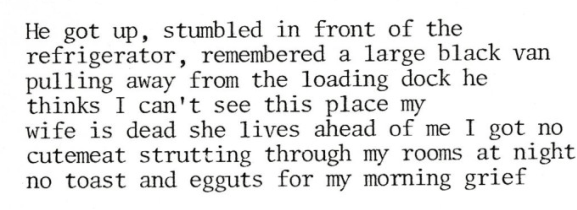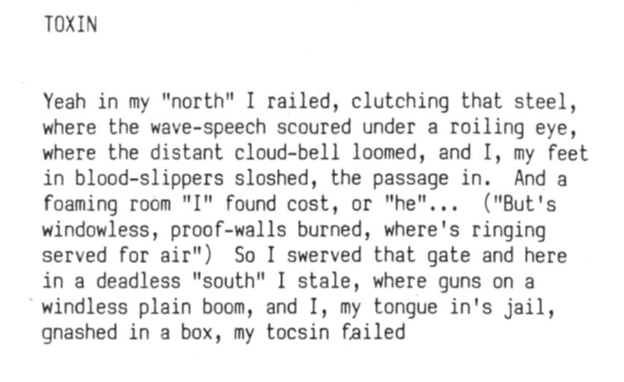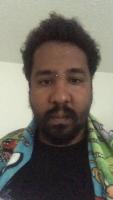On reading John M Bennett’s 'Select Poems'
Prior to reading John M. Bennett's Select Poems (Poetry Hotel Press and Luna Bisonte Productions, 2015), I had never heard about the author but got a bit of sense of his style after reading Ivan Arguelles’ introduction to the book. Think visceral imagery, newspaper aesthetic, collage. Think urgency. In pages 24 through 28, how Bennett plays with the structure and space of the paper and the font introduce this universe. The small fonts contrasts with the large ones in ways that are exciting. Reading the first poem "Look," (p24) I feel as if I am a passenger in a speeding car and the driver is some other version of myself, one who does not care or who is oblivious of consequence while the passenger is wondering where the car is going in hidden emotion.
Pages 24 to 27 almost feel like a series of photographs, like Robert Frank's "The Americans" meets William S. Burrough's "Naked Lunch." I get a grim view of a ceaseless American acceleration. The sequencing feels like 60s Jazz, more Coltrane than Miles. Bennett's writing doesn't follow a linear logic but more of an R.E.M / dream logic. He creates his poems not through linear descriptions of scenes, or feelings but in visual compositions using sentences. Reading these poems feels like tapping into your subconscious, like an explorations of a possible mental free-fall from the narrator's perspective. He is an aesthetic absurdist, not like Camus or Dostoyevski, but like Kafka, Burroughs or Gogol. His writing takes you to a place where you are forced to confront the very absurdity of life, through the absurdity of the work.
The poem "His Shoes" (p36) is a good example of Bennett's absurd story telling aesthetic. The poem starts with a man who just woke up, or who just got to work and is pondering on breakfast options. He is remembering a scene from work but as if the narrator is unclear in his own mind, the poem switches perspectives in the same sentence that makes up the stanza:

Though in this first stanza we do get a sense of place, Bennett leaves us confused as to who the narrator is, the "He" or the "I" and the poem continues as if this perceptual transgression didn't happen. The initial pronouns "He" and "I" are never solved. We can however accept that the grieving man becomes the narrator as the poem progresses and we follow him at work where the perspective is clearer now. He avoids his boss, the possible "He," "Mr. Suitts" that makes him think of "babies chopped in litter cans..." The narration will continue with this perspective which itself becomes clear, but the scene is now dream-like, all thanks to this initial confusion in the first stanza. It is as if we are violently thrown into someone's moment of profound realization. The poem blends worlds of fantasy and lost childhood, through word games, sound games and nicknaming "I got no / cutemeat strutting through my rooms at night / no toast and eggust for my morning grief" and "I'll tell them that my / KAKK gaspeak is the closest to the truth..." and "I'm / nothing but a squaredoff foot machine stomping round in circles / Mr. Nips stands at the office window." The narrator's personalizes this environment that was at first chaotic through this childish humor, which becomes his (the narrator's) coping mechanism. Through imagery and language more than sentence structure, we have followed the narrator and now understand the scene as witnesses and we can now picture this narrator trying to find his ground, and ironically dreaming to find it. A sad irony bleeds through the poem. In the end we are left with the narrator's thoughts about the feet of other characters in the poem and he might be wondering if they too aren't "stomping round in circles."
Part of me wonders if John M Bennett’s poems are trying to describe the inner workings of the mind in moments of turmoil, those moments when we lose our grip on meaning and things feel like they could topple over us, or become something new, moments when our anxiety, fear, curiosity, or awe, if taken far enough, can transform a cat into a friend or a monster, a person to a bloom or a devil, our past into mush or a key. His poems are at once contemplations and cruel and/or pathetic jokes. The poem “Diptick For A Lady” (p40) really shows this. In the first two stanzas: “I looked inside her room she / a sea inside a / stone afloat she looked at me was…” The line here, interpreted literally, would make no sense, so we are obviously moving towards something more allegorical. The “sea” here alludes to potential, power and/or threat, the “stone” the thing that balances the woman the narrator is talking about. As the poem moves, we get that the narrator is talking about his daughter “sticking out her gum I / saw her smug her lust her / smile, twitching toward me.” The suddenness of the poem creates movement. As I read through, I am shocked by the “smug” and lust and smile of this daughter that seemed to have bloomed from this room into a bursting organism that overflows with life. Bennett is able to do this because of the absurdity of the introduction and the musicality of the poem. “In my arms she was a / house with windows spouting hair I / touched her flow…” he continues. Now this daughter has almost merged with the room and this sea that was inside has become “flow,” potential. It’s as if the narrator can see beyond the person. We are now in the moment with him, and he is witnessing life, in full mystery: “breasts were washing over stars and circles flashing on her hands / she breathed with me I found a / door and stood out there / panting in her space.” The descriptions and metamorphosis in this poem are what would be if a Post-Impressionist and Cubist painting collided into one, and Bennett does this by keeping the mystery of life fresh within this daughter the vehicle of the poem.
It’s as if Bennett writes actual sentences and proceeds first by elimination, then by alliteration. The musicality and the play of on the words that create a visceral imagery, both shocks and humors, “What stink distinctions made, that sunk / field of trash, spewed like a face in its / past…” from “Ascetic Aesthetic” (p94). I find myself exploding with laughter and being confused at the same time reading his poems. The poems are more visual art through sentence composition than actual literary oeuvres. They are sequences of images that are meant to create meaning, and the involvement of the reader is as crucial to the process. But, unlike pretentious literature, even casual readers can find pleasure here, due the simplicity of his messages. He uses font art in between to keep the reader engaged in this absurd environment, further emphasizing the visual nature of his craft. This book is something you can read while drinking coffee, without too much thought, or with lunch, or during your 5 minute break, or during a longer break. It’s like a game of pitch and catch, that leaves you smiling for the most part. I’ll leave you with my personal favorite from the selection “Toxin” (p81):


Darryl / Dadou / Baron Wawa is a Port-au-Prince born Haitian-American who studied Photography and Creative Writing. He enjoys chocolate and good books. That said, maybe a movie is a good book. He loves to work with images and words and their pairing.


